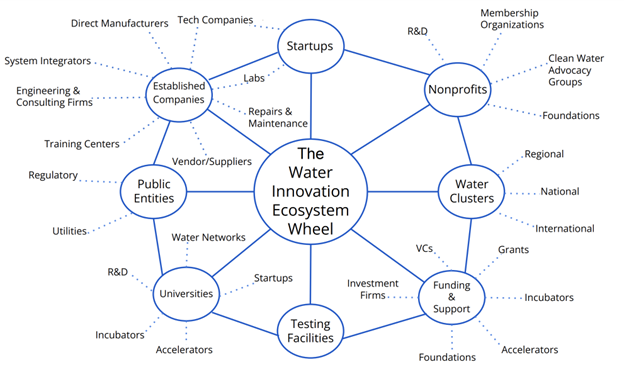Clean water is essential for the health and well-being of individuals and communities, and it is important to remember that all water is connected.
It is essential to acknowledge this connectedness of water at each step of human intervention in the water cycle, including producing drinking water, treating wastewater, and managing stormwater. The New England Water Environment Association (NEWEA) is a professional membership organization with a demonstrated history of success educating, training and convening water and environment stakeholders. After a recent merger between NEWEA and the Northeast Water Innovation Network (NEWIN), the Innovation Council was formed, which enhanced the organization’s focus on connecting water innovators, academics, customers, and support groups.
For too long, the water industry has been segmented and siloed, yet professionals, researchers, and developers working in different branches of the water industry–drinking water, wastewater, water reuse–are all working to achieve the same goal: to improve water quality and ensure sustainable access to clean water and sanitation. NEWEA feels that adopting a “one water” concept and recognizing the circular connection in the water industry could increase collaboration and communication efforts across the water sectors.

NEWEA will use the water wheel graphic and the cataloged industry data to help form connections between water professionals and assist innovators with solutions to common problem areas in New England. The COVID-19 Pandemic and increased media attention on PFAS/PFOA and other water contaminants has heightened interest in encouraging new research and entrepreneurial efforts. It is NEWEA’s hope that this research will spur new technology that can be implemented to address issues that threaten environmental and public health.
The implementation of new, often more sustainable water quality innovations will benefit all individuals residing in New England, especially historically underserved populations, such as low-income and/or minority individuals, both in urban and rural areas in the region. These communities have the greatest need for technological improvements to their drinking water and wastewater systems, which will help work towards the goal of ensuring access to clean water and sanitation for all.


 Marianne Langridge is the Director of the Innovation Council and CEO of Sustainable Synthesis Limited, PBC. She recieved her PHD and Masters's from the University of Pennsylvania in Systems Engineering.
Marianne Langridge is the Director of the Innovation Council and CEO of Sustainable Synthesis Limited, PBC. She recieved her PHD and Masters's from the University of Pennsylvania in Systems Engineering.